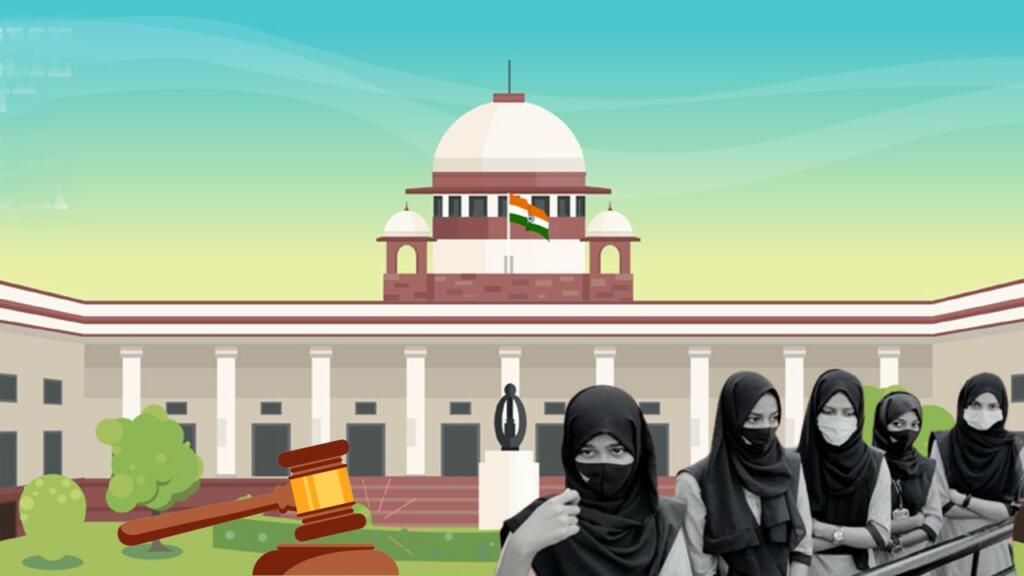- Pro Hijab activists approached the Supreme Court seeking an urgent hearing on their matter
- Chief Justice refused to entertain the plea and asked them to check in through normal procedure
- Petitions after Petitions are being filed, undermining the other petitioners’ rights, so the Supreme Court had to draw a strict line
Indian polity has favoured a certain section of the population for so long that they are not able to digest even the equality of opportunity. Pro Hijab activists are also one of them. However, the Supreme Court has delivered a knockout punch to their in-Court activism.
It has nothing to do with examination-CJI Ramana
A bench presided by Chief Justice of India (CJI) NV Ramana himself has refused to provide privileged hearing to pro Hijab activists opposing the ban on Hijab in educational institutions. A bunch of petitioners have approached the Supreme Court requesting it to reverse the judgment of the Karnataka High Court concerning the Hijab ban.
Devadatt Kamat, a Senior Advocate, is representing pro Hijab activists in the matter. On March 24, Kamat requested the Supreme Court to start hearing his plea considering it as an urgent matter. Effectively, according to Kamat, Hijab activists’ petitions hold more importance than other matters of national importance.
Kamat Justified the urgent plea by stating that girls’ exams are to be held later this month and if they are denied entry, it will hurt their career. However, the Chief Justice refused to accept the plea. Destroying the examination argument, CJI Ramanna said, “Exams have nothing to do with the issue……don’t sensationalise the issue.”
Solicitor General (SG), Tushar Mehta, representing the Karnataka Government also pointed out that the petitioners are repeatedly trying to invoke passion by mentioning the examination issues.
However, Kamat persisted in his argument about examinations. “These are girls…the exams are from 28th. They are being restrained from entering the schools. One year will go” said Kamat. CJI refused to pay any heed and quashed the petition and called for the next matter to be brought for hearing.
Karnataka High Court’s observation
As reported by the TFI, earlier this month, Karnataka High Court had refused to grant permission to female students to violate the dress code of educational institutions in which they had enrolled. These girls had insisted that they should be allowed to enter into institutions wearing the Hijab. According to them, wearing Hijab is an essential religious practice in Islam.
When schools denied them permission, they filed writ petitions in Karnataka High Court with the aforementioned argument. Dismissing the writ petitions filed by various organizations against the Government of Karnataka to ban Hijab in schools, Karnataka High Court observed that Hijab is not an essential religious practice of Islam.
High Court observed that “The Holy Quran does not mandate wearing Hijab or headgear for Muslim women. Hijab at most is a means to gain access to public places and not a religious end itself. At the most, the practice of wearing this apparel may have something to do with culture but certainly not with religion.”
Read more: Hijab is not an essential practice of Islam: Karnataka High Court
They are habituated to favourable treatment
This is not the first time these petitioners have asked for special treatment for themselves. When the original petitions were filed in Karnataka High Court, these petitioners had urged to directly transfer the case to the Supreme Court, bypassing the Court lower in the hierarchy to apex Court. Moreover, they had also asked to quash the temporary order (then) by High Court to uphold the Hijab ban. Even then CJI Ramana had refused to entertain these pleas.
Read more: Ambedkar would have cried today, not for Hijab, but for the non-implementation of Uniform Civil Code
Pro Hijab activists seem to be properly trained to take advantage of the minority appeasement tilt of Indian polity. That is why they keep filing petitions after petitions on the same issues, without any care for the pendency of millions of cases. However, with the refusal to urgent hearing, the Supreme Court has now drawn the line.
